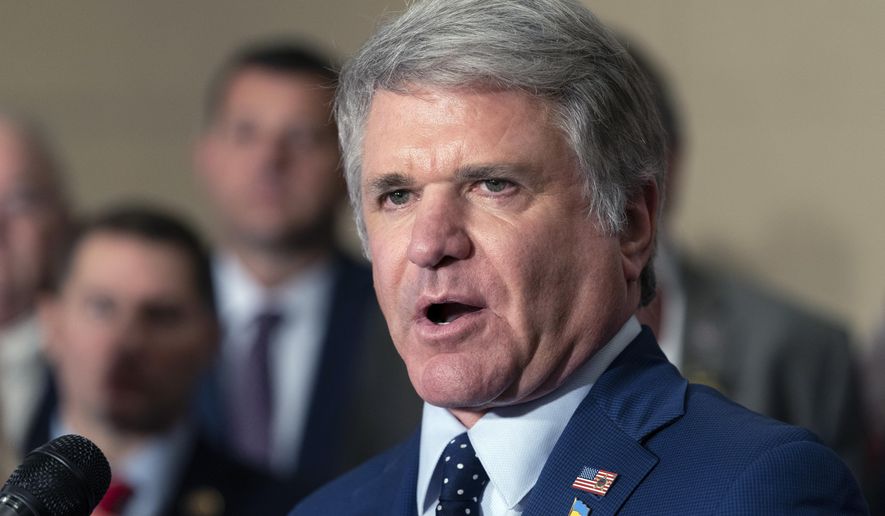House Republican lawmakers on the Foreign Affairs Committee Tuesday sent a letter to U.S. Secretary of State Antony Blinken accusing the State Department’s Global Engagement Center of censorship and demanded more information.
The letter was spearheaded by House Foreign Affairs Committee Chairman Michael McCaul of Texas and co-signed by Subcommittee on Oversight and Accountability Chairman Brian Mast of Florida, Subcommittee on Global Health, Global Human Rights, and International Organizations Chairman Chris Smith of New Jersey, Reps. Darrell Issa of California, Maria Elvira Salazar of Florida, Keith Self of Texas, Cory Mills of Florida and Ken Buck of Colorado.
The Republicans noted that last year, the House Foreign Affairs Committee determined it was appropriate to postpone reauthorizing the GEC until issues related to internal staffing, organizational structure and policy priorities were resolved — issues that arose after the State’s Department’s inspector general issued a detailed report chronicling inappropriate actions by the GEC.
The State Department did not immediately respond to a request for comment.
“The GEC’s founding mission, effectively, was to provide a ready resource for the truth about America and our fight against global terror, particularly ISIS,” the lawmakers wrote.
“[But now we] are forced to wonder about the authority by which the GEC justifies its mission creep, and the direction of its current evolutionary trajectory. Congress originally authorized the GEC to ‘support the development and dissemination of fact-based narratives and analysis to counter propaganda and disinformation directed at the United States and United States allies and partner nations.’”
They wrote, “While the GEC performs some unquestionably important work, it has also provided social media companies with access to tech applications that ‘detect and either knock down or flag malign-foreign-influence activity,’ but, according to the FBI, also ‘might accidentally pick up U.S. people[‘s] information.’”
Democrats, though, say the GEC is necessary to battle “Russian misinformation” and propaganda being spread by the China Communist Party.
“I’m of the belief that the GEC needs to take a primary, rather than secondary role, when it comes to the way in which we counter misinformation around the world. I think often the Department of Defense, which has a budget that dwarfs that of the GEC, doesn’t always have the sensitivities that the State Department does about what messages work and what doesn’t,” Sen. Chris Murphy of Connecticut said in late March during a Senate Appropriations hearing on President Biden’s 2024 budget.
“But what concerns me more is that we have ahead of us the reauthorization of the GEC, we’ve got to put it back on the books, and there is really no way to combat Russian misinformation, their propaganda efforts, which are integral to their campaign against Ukraine, or China’s efforts to expand its reach without the GEC,” Mr. Murphy said.
Congress originally authorized the GEC in 2016 to “support the development and dissemination of fact-based narratives and analysis to counter propaganda and disinformation directed at the United States and United States allies and partner nations.”
The lawmakers listed several instances since 2021 when the GEC “disfavored opinions particularly by established conservative media and individuals” through grants, partnerships, and awards to entities including the Global Disinformation Index, the Institute for Strategic Dialogue, the Atlantic Council’s Digital Forensics Research Lab, and Moonshot CVE.
The panel called for all documents and communications between the GEC and any entity with a domestic presence in the United States, including media outlets, mentioning the terms disinformation, disinfo, misinformation, misinfo or malinformation.
The panel also requested all documents and communications regarding the U.S. Department of State’s contracts, grants, cooperative agreements, or other agreements for assistance covered in section 200.40 Federal financial assistance of the OMB Uniform Grant Guidance to any of the following entities:
· Alliance for Securing Democracy;
· Atlantic Council;
· Digital Public Square;
· German Marshall Fund of the United States;
· Global Disinformation Index;
· Google Jigsaw;
· Institute for Strategic Dialogue;
· Moonshot CVE;
The GOP lawmakers also want all documents, emails and correspondence to/from employees, contractors, subcontractors, or consultants at the GEC mentioning “disinformation”, “misinformation, or “malinformation” in conjunction with the Washington Examiner, Real Clear Politics, the Federalist, Newsmax, Breitbart, the Daily Wire, One America News, and the New York Post.
The committee also sought all documents, emails, and correspondence to and from employees, contractors, subcontractors, or consultants at the GEC pertaining to content moderation decisions by social media or online tech platforms in connection with Covid-19 policies and practices.
• Kerry Picket can be reached at kpicket@washingtontimes.com.




Please read our comment policy before commenting.